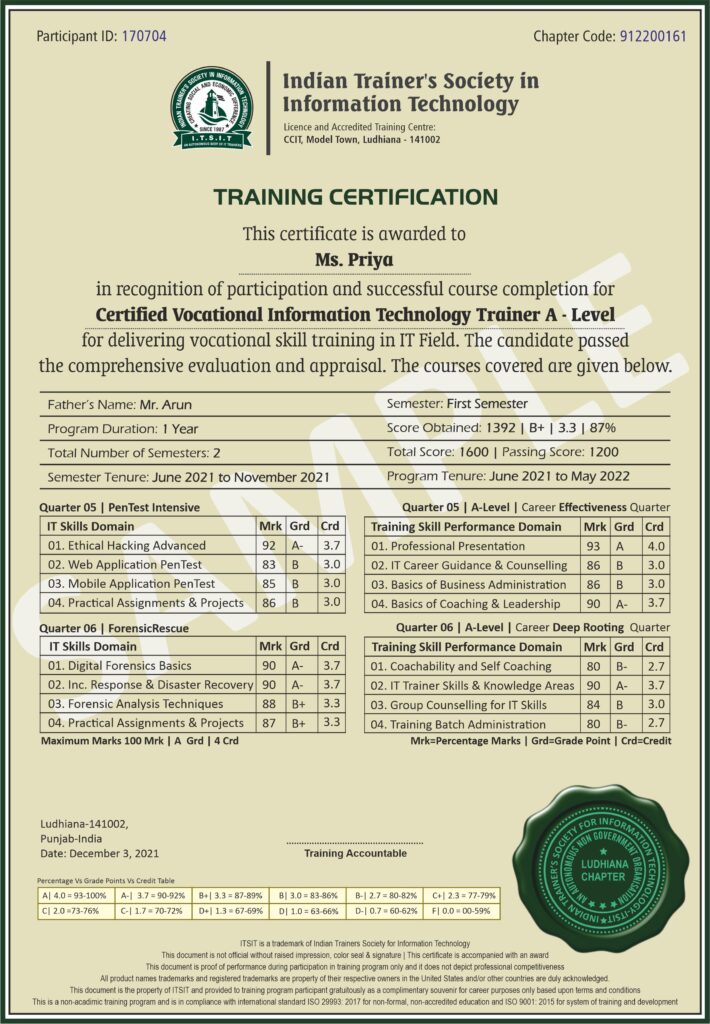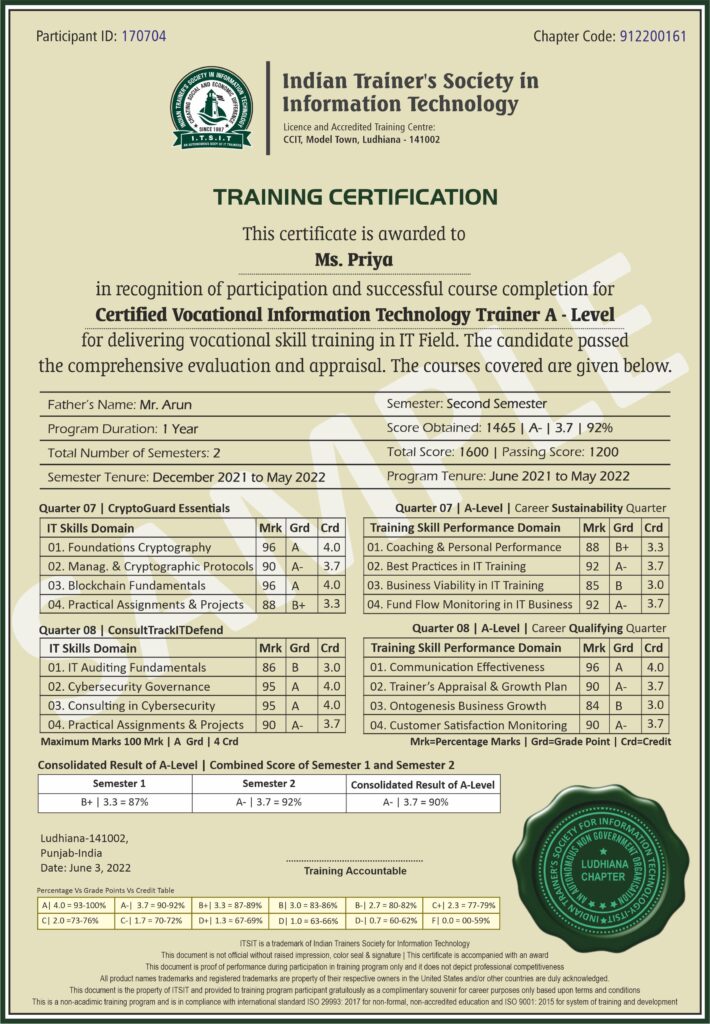A - Level | TOT Program
The A-Level represents the intermediate stage of the Training of Trainers (TOT) program, aimed at building on the foundational cybersecurity skills developed in the O-Level. It introduces more specialized topics such as penetration testing, incident response, digital forensics, and cloud security, preparing trainees for real-world cybersecurity challenges. The purpose of this level is to transition participants from general IT practitioners to cybersecurity specialists capable of threat detection and security testing. The intention is to produce trainees with the skills necessary to secure IT systems and respond to security incidents effectively.
Duration
1 Year
Eligibility
B.Tech | MSc IT | M.Tech | PHD
Format
Offline
Outcomes
Skill Certificate
A-Level - Semester 3
It introduces trainees to the practical application of intermediate cybersecurity techniques, focusing on offensive security measures and incident response. The purpose is to ensure that participants gain hands-on experience in simulating cyberattacks, detecting vulnerabilities, and mitigating risks. The intention is to equip trainees with essential skills for identifying and addressing security threats in both traditional and cloud-based infrastructures. It includes following two quarters:
05 Quarter - PenTest Intensive
Quarter 5 focuses on penetration testing, a key element of offensive security. The purpose is to familiarize trainees with ethical hacking techniques, enabling them to identify system vulnerabilities before they are exploited by malicious actors. The intention is to build a strong foundation in offensive security practices, including advanced ethical hacking and application security testing.
Courses in Quarter 5:
- Ethical Hacking Advanced
- Web Application Penetration Testing
- Mobile Application Penetration Testing
06 Quarter - ForensicRescue
Quarter 6 shifts focus toward forensic analysis and incident response. The purpose is to train participants in identifying, analyzing, and mitigating the impact of security breaches. The intention is to ensure trainees can effectively manage cyber incidents, recover compromised systems, and perform forensic investigations.
Courses in Quarter 6:
- Digital Forensics Basics
- Incident Response and Disaster Recovery.
- Forensic Analysis Techniques
A-Level - Semester 4
Semester 4 continues the journey into specialized cybersecurity fields, focusing on cryptography and IT governance. The purpose of this semester is to develop trainees’ ability to protect data through encryption and manage cybersecurity risks at an organizational level. The intention is to prepare participants for leadership roles in ensuring information security and governance. It includes following quarters:
07 Quarter - CryptoGuard Essentials
Quarter 7 introduces cryptographic methods and blockchain technologies, focusing on how they are used to secure digital communications and transactions. The purpose is to develop a deep understanding of cryptographic protocols and their applications in cybersecurity. The intention is to prepare participants for roles requiring strong encryption skills and secure communications management.
Courses in Quarter 7:
- Foundations of Cryptography
- Management and Cryptographic Protocols.
- Blockchain Fundamentals
08 Quarter - ConsultTrackITDefend
Quarter 8 shifts focus to cybersecurity consulting and governance. The purpose is to train participants in IT auditing, policy-making, and cybersecurity governance, ensuring they are prepared to offer consulting services and lead in organizational security. The intention is to produce cybersecurity professionals who can guide organizations in maintaining secure infrastructures and complying with cybersecurity regulations.
Courses in Quarter 8:
- IT Auditing Fundamentals
- Cybersecurity Governance.
- Consulting in Cybersecurity
A-Level | Semester -3 | Transcript
A-Level | Semester -3 | Transcript


Intended Outcome of A-Level
The A-Level of the Training of Cybersecurity Trainers (TOT) Program is designed to produce cybersecurity professionals with specialized skills in offensive and defensive security. By the end of this level, participants will have gained practical experience in penetration testing, digital forensics, incident response, and cryptography. Trainees will be equipped to identify and mitigate security threats, manage cyber incidents, and implement encryption techniques to protect sensitive data. They will also be prepared to take on more complex cybersecurity roles, demonstrating proficiency in both securing IT systems and responding to attacks. The A-Level aims to transition participants from general IT roles to focused cybersecurity specialists, capable of handling advanced security challenges in real-world environments.
By the completion of the A-Level, trainees will:
- Master intermediate offensive security techniques: Gain hands-on experience in ethical hacking and penetration testing to proactively identify and address vulnerabilities in IT systems.
- Develop advanced incident response skills: Be capable of effectively managing and mitigating the impact of security breaches, restoring compromised systems, and performing thorough forensic analysis.
- Strengthen expertise in digital forensics: Learn how to collect, analyze, and preserve digital evidence for investigating cyber incidents and supporting recovery efforts.
- Enhance cloud and application security knowledge: Secure cloud-based infrastructures and conduct advanced web and mobile application penetration tests, preparing for modern IT environments.
- Understand cryptographic protocols: Be proficient in applying cryptographic methods to secure data, ensure confidentiality, and protect communications.
- Prepare for leadership in cybersecurity operations: Be equipped to consult on IT security governance, perform IT audits, and develop security policies for organizations.
- Transition to specialized cybersecurity roles: Be ready to take on roles requiring deeper cybersecurity expertise, moving from general IT practitioner to cybersecurity specialist capable of addressing both offensive and defensive security challenges.
